#aldmer
Explore tagged Tumblr posts
Text
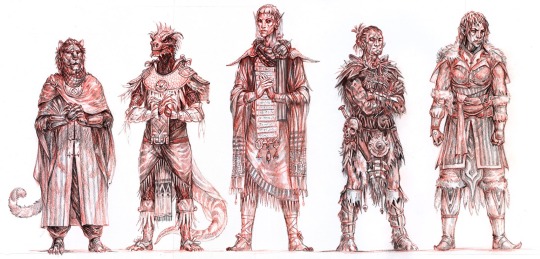
Khajiit, Argonian, Ancient Elf, Reachman, Orsimer
Art for Tales of Tamriel
Art by Jan Pospisil
#jan pospisil#the elder scrolls#art#concept art#tes#tales of tamriel#fantasy#character design#khajiit#argonian#reachmen#orsimer#orc#high elf#aldmer#eso#the elder scrolls online
413 notes
·
View notes
Text

"Let's put the 'romance' back into 'necromancer'!" 💀🖤
Alternatively.. "Would you still love me if I were a worm?" 🪱
Mannimarco, King of Worms. Made with graphite pencil and pen. (Click on the picture for better resolution.)
Happy Valentine's Day!
#mannimarco#king of worms#lich#necromancer#the worm king#elder scrolls art#fantasy#tes fanart#elf#eso#skyrim#elder scrolls online#tes#eso art#skyrim art#elder scrolls oblivion#oblivion art#tesblr#anime#video game art#elves#high elf#altmer#aldmer#lich king#elderscrollsart#elder scrolls#morrowind#daggerfall#scythe
86 notes
·
View notes
Text
I know Ohmes/Ohmes-raht aren’t technically elves but because they can pass and I think even breed with other elves they can count?
Also I would love to hear your thoughts and comments.
#the elder scrolls#skyrim#oblivion#morrowind#valenwood#dwemer#chimer#ayleid#maormer#aldmer#falmer#elves#elder scrolls#elder scrolls lore#tumblr polls
29 notes
·
View notes
Text


#tes#elder scrolls#the elder scrolls#celedanwe#oc tag: celedanwe#lich oc#liches#necromancer#necromancy#undead#fantasy#oc artwork#original character#artwork#oc art#art#aldmer#aldmer oc#spotify#Spotify
11 notes
·
View notes
Text

A scene from a wonderful fanfiction
https://ficbook.net/readfic/6769933
13 notes
·
View notes
Text
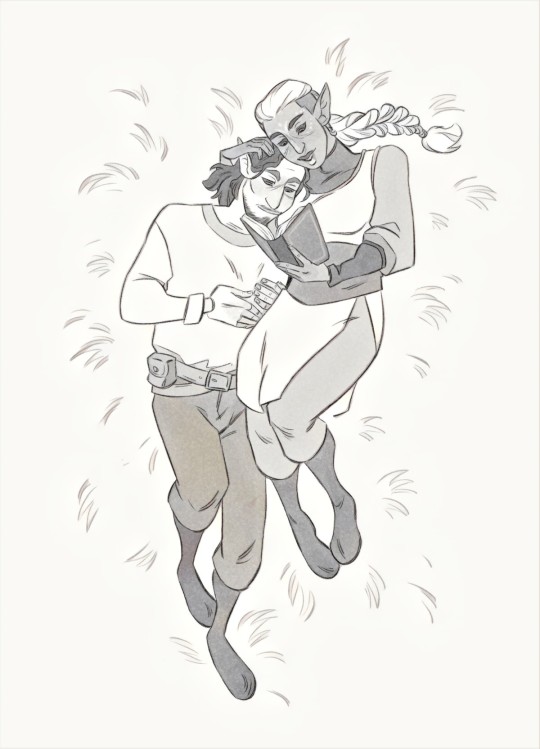
Dunmer fairytales for her aldmer friend about Moon-and-Star of course 💫
14 notes
·
View notes
Photo
Ok but was anyone going to tell me that Khajiit are another Ehlnofey offshoot or was I supposed to learn this from the post about how Aldmeris is not real?

Did You Know: According to Mysterious Akavir, while Akavir means “Dragon Land”, Atmora means “Elder Wood”, and Tamriel means “Dawn’s Beauty”, the meaning of “Yokuda” has been kept a secret?
#elder scrolls#tes#lore#elves#mer#bosmer#altmer#dunmer#chimer#dwemer#orsimer#aldmer#khajiit#aldmeris is a lie#creation myths#ehlnofey#tamriel
2K notes
·
View notes
Text
I think aldmer were a reasonably sized, compact elf with deep golden/brown skin most closely resembling modern day bosmer but the thalmor have been suppressing the evidence because that would mean they weren't the purest unaltered form of mer
141 notes
·
View notes
Text
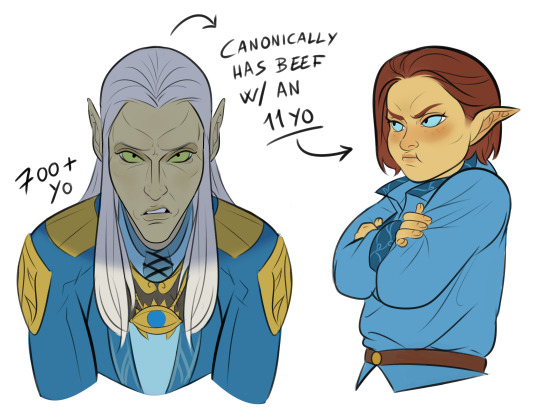
I promised to make this post months ago and completely forgot about it until the last few days (a classic!), so here I am now. Making it. And with silly art included. Yay!
As many of you know, Mannimarco and Vanus Galerion in Elder Scrolls Online are portrayed as 2E contemporaries who mirror each other journeys to leaders, out of the Psijic Order and into their own groups. ESO makes it clear that they're meant to be similar in age as well, and it does so both by de-aging Mannimarco's model for the "Half-Forming Understandings" quest, and by making it say by Vanus himself in Artaeum Lost.

BUT! If you have played Morrowind or Oblivion, you might already be familiar with Where were you when the Dragon Broke?, an account of different people's experiences during the Middle Dawn, the 1E Dragon Break. And oh! Look who it is.

(notice also he says God, not King) The Middle Dawn happened between 1E 1200 and 1E 2208. Time fuckeries as much as you want, but nonetheless, 1E ends in 2920, and we know FOR SURE that Vanus was born the first years of 2E and that he joined the Psijics as a 11 yo. So, even if we took into consideration ONLY the latest period of the Middle Dawn, Mannimarco would have been a... 700+ years old novice when he met Vanus. Very funny to think about, but an old mer having an intellectual rivalry with a teenager doesn't really scream "brilliant" to me.
I'd say the retconning of his age is also supported by Worm Saga, were he doesn't mention at all his period in the Maruhkati and makes it sound like he was either born or taken to Artaeum at a very young age.

Plus, both in Worm Saga and in the Vault's flashbacks and in every other source ever (WRITTEN FOR ESO. AHEM.) we see that his "discovery" of necromancy happened on Artaeum. Like, it's screamed into our ears a couple of times or more in the game itself.
The problem with all of this? The book that implies he lived through the Middle Dawn is still present in ESO.
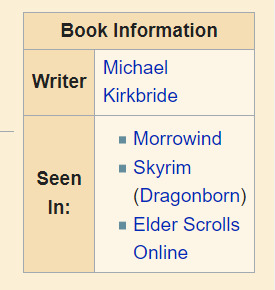
Which is to me one little example of a bigger issue with ESO writers rewriting/retconning things without taking away/trying to somewhat link the original sources. But I digress, there are different ways to make this work but since some are too complicated to be discussed now, I'll just share with you what I usually go with;
Mannimarco is a great liar. Not only a liar, a politician. A sales man. A guru. He knows how to give himself prestige. What "Where were you when the dragon broke?" is to me is either fake accounts fabricated by the Cult themselves, or stolen accounts (probably from Artaeum's archives!) where his false experience was added and then sent around Tamriel.
If I had to make a TIMELINE for all the pieces cited, I would say the publication order would be "Where were you when the dragon broke" (used as propaganda by the Cult to make Mannimarco's figure important)-> "Artaeum Lost" (disproves what was fabricated about Mannimarco)-> "Worm Saga" (new attempt to give himself prestige with that "aldmer, scion of et'Ada").
#mannimarco#king of worms#god of worms#artaeum lost#where were you when the dragon broke#worm saga#eso#tes#im sweating#feel free to add stuff. There are other sources to cite but i think these are enough to make my point#tesblr#doodles#by the way fuck you Kirkbride this is your fault
251 notes
·
View notes
Text
House Dagoth fanlore, part 1
The House Dagoth has always been unique in its worldview. They were neither slaves, nor poor, nor middle-class when their ancestors decided to join Veloth - they came from the upper class, but their ambitions, like those of the Telvanni ancestors, were actively denounced. But if Telvanni wanted to gain knowledge by any means, Dagoth “foresaw” their purpose and were driven solely by it. Among the rest of the Chimers, House Dagoth was the least changed, despite its proximity to the Red Mountain - among them, one could often see statuesque, tall mer with dark skin, one of the few signs of their close kinship with the Aldmer. Even during the First Era, Dagoth could be seen with not only golden, but also green eyes, like Lord Vemyn and Lord Gilvoth. Nevertheless, the isolation of the House on the island and their unsociability did not prevent them from intermarrying with other Houses, and even with other races - they managed to establish contact with the Dwemer, and the percentage of mixed children among the Chimer race was the largest in this house, after the Lesser House of Mora. There was also a downside - according to rumors, House Dagoth was accused of inbreeding. Among the conservatives at the time, Dagoth seemed loyal enough to their bastards, including Lord Endus - as a half-dwemer, he retained his status as one of the important figures of the House and subsequently contributed to the establishment of ties between Chimer and Dwemer people during Nerevar's campaign, allowing the integration of the discoveries of the deep elves and making them “understandable” for others. In fact, the House had its own ecosystem - polygamy and polyandry were not frowned upon, on the contrary - the most suitable candidate for the head of the House was chosen from among the many wives and children, which helped to avoid unnecessary problems and unnecessary dramas, but the sequence was still present - the firstborn was the first in line, and those who followed him could refuse the succession. This happened to Dagoth Voryn, the youngest of the brothers - someone died, and someone refused, thereby giving the latter a chance to lead the throne. In exceptional cases, the right of inheritance was transferred to close relatives on another line. At that time, the left half of Vanderfell belonged to House Dagoth - Redoran and Hlaalu were then exclusively on the mainland. It was only at the beginning of the 1E, Dagoth started to support House Hlaalu, which had lost territories due to the breakaway of House Dres, and established trade contact, allowing the settlement of the southern shores of the island. Although Kogoruhn is now buried under a huge layer of ash, there used to be a full-fledged, vibrant city around the fortress. The gardens, alleys, flora and its diversity were amazing, and traces of this past can be seen in the Vemynal, where Lord Vemtn allowed vegetation to “refine” the Dwemer walls, ceilings, and pipes with vines that leave a trace of corrosion. However, the volcanic eruption forever changed the appearance of the island, leaving lava scars on it, and the very garden where Araynys, Endus and Odros gathered in the evening remained only in memory.
#tes#the elder scrolls#morrowind#house dagoth#sixth house#headcanons#i'll be glad to hear your hc too! i already prepared some stuff to continue but before that i need to write about ash brothers first
37 notes
·
View notes
Text
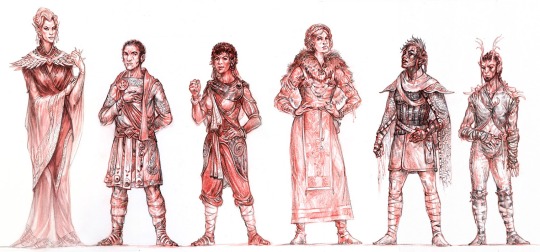
Aldmer, Imperial, Redguard, Nord, Dunmer, Bosmer (all labels are per the artist)
Art for Tales of Tamriel
Art by Jan Pospisil
#jan pospisil#the elder scrolls#art#concept art#tes#tales of tamriel#aldmer#imperial#redguard#nord#dunmer#bosmer#wood elf#dark elf#altmer#high elf#eso#the elder scrolls online
183 notes
·
View notes
Text

Count Verandis Ravenwatch. Made with mechanical pencil and pen.
#verandis#verandis ravenwatch#elder scrolls art#fantasy#tes fanart#elf#eso#elder scrolls online#skyrim#tes#traditional art#tesblr#eso art#high elf#altmer#aldmer#house ravenwatch#vampire elf#vampire#the elder scrolls#elder scrolls
37 notes
·
View notes
Text

9 year old Halric's full name is Halric of the Gold House of Aldmere. As a Drahn, his lineage traces back to his Voeburtite roots. House Aldmere contained 3 houses, where the Black House issued a succession of kings.
49 notes
·
View notes
Text

bébé
#tes#elder scrolls#the elder scrolls#celedanwe#oc tag: celedanwe#oc artwork#oc art#lich oc#lich#aldmer#aldmer oc#ms paint
12 notes
·
View notes
Text
Did you know the terms Chimer and Orsimer mean "Changed Folk" and "Cursed Folk" respectively?
These names of course reflect the view of the Aldmer people toward their altered kin. However, I would argue the Aldmer were fucking stupid because living in a society without hot orc women is objectively worse than being green.
27 notes
·
View notes
Text
The Towers and the Thalmor
This is, unabashedly, me putting on my most exquisite tinfoil hat and theorizing what I believe to be the goal of the Thalmor in the Elder Scrolls universe.
Spoilers for all the major Elder Scrolls games, I think?
So, what do the Thalmor want? According to the loading screens in Legends, and the Infernal City by Greg Keyes, the Thalmor wish to subordinate all other peoples of Tamriel and "bring about a new Merethic era".
I find this somewhat lacking as an overarching goal. Simply taking control over Tamriel is something that the Cyrodiilic empires of Alessia, Reman and Septim have tried, and to varying extents, succeeded in before. Subjugating the other races seems a little bit on-the-nose. So what instead? What do they mean by bringing about a new Merethic era?
Well, the beginning of the Merethic era is considered the introduction of the Adamantine Tower to Mundus, and the beginning of linear time at the Convention. There, Lorkhan was punished for his treachery in creating the world, and by his execution, two more Towers were formed, or at least their essence was implanted in Mundus: the Red Tower and the White-Gold Tower, alongside their respective stones, the Heart of Lorkhan and the Chim-el Adabal, the gem at the center of the Amulet of Kings.
The Towers that formed after the Adamantine Tower was placed (or flown onto, or constructed on) on Nirn, seem to be the origins of the differences between the elves, what allowed the Bosmer and Chimer and all the other mer to distinguish themselves from the Aldmer, and later the Altmer. Condsidering Crystal-Like-Law is meant to be a copy of the Adamantine Tower, I personally theorize that the Altmer are in fact closest to what the Aldmer were like before the sinking of Aldmeris.
Thus, I think that "subjugating" the other races is less about subordinating the other elven races under the iron fist of the Thalmor and the Aldmeri Dominion, but more about forcing them to revert to a more Aldmeri state, in essence making all elves return to their pre-sinking of Aldmeris forms. The humans and beastfolk might simply be subjugated, though.
But I think it might even go further than that. I think the end goal of the Aldmeri Dominion is nothing less than the un-creation of Mundus. Notably, I don't think the goal is merely destruction, as Alduin or Satakal might aim for, but the undoing of the very creation of Mundus. In essence, undoing what Lorkhan tricked the Divines into doing.
The Altmer give us the terms "Aedra" and "Daedra", meaning "our ancestors" and "not our ancestors". I think the goal of the Aldmeri Dominion is to return the stolen strength and power of the Aedra to them, power which is used to maintain the constant that is Mundus, and which allows for linear time, and to return the elves to a state where they were indistinguishable for other et'Ada, other powerful ancestral spirits.
To do this, the collective strength of all elven nations might be required, which would explain the conquering tendencies of the Aldmeri Dominion and the Thalmor, while also giving a reason for the seeming destruction of the Towers around Tamriel.
So, how far have they gotten? And what is the final act?
Well, which Towers are operable?
Crystal-Like-Law - Seemingly inoperable, according to "Rising Threat", but might still be operable in other planes of existence.
Red Tower - Probably inoperable, considering the destruction of the Heart of Lorkhan by the Nerevarine, but might simply need a new Stone.
White-Gold - Inoperable, as the Chim-el Adabal is destroyed.
Orichalc - Unknown, thought inoperable with the sinking of Yokuda.
Snow Throat - Likely operating.
Green Sap - Perchance.
Walk-Brass - A conundrum. Thought inoperable, might simply need rebuilding and a new power source.
And the last Tower. The site of the Convention, Ada-Mantia. Likely operating, considering linear time continues on Mundus, this is, in my opinion, the final goal for the Aldmeri Dominion. To destroy or disable Ada-Mantia and break the Earth-Bones which bind the Aedra to Mundus.
My sincerest hope for the Elder Scrolls 6, aside from re-introducing spears, is that the Adamantine Tower becomes an important site for the plot, if it truly is set in the Iliac bay region.
This has been a cathartic embrace of my inner tinfoil hat-wearing lore nerd.
I'm probably wrong (for canon), but I love the Elder Scrolls, and I will head-canon this always.
20 notes
·
View notes